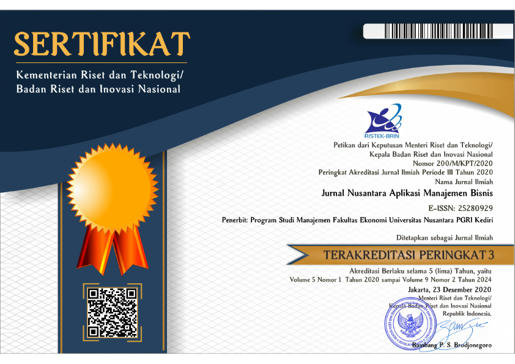Analisis Kualitas Layanan Terhadap Penggunaan Aplikasi Blended Learning Menggunakan Model EESS
DOI:
https://doi.org/10.29407/nusamba.v8i1.18490Keywords:
Service Quality, Lecturer and Student Quality, Satisfaction, utility, benefitAbstract
Research aim : This study aims to test the Quality of Moodle Borneo E-Learning (BEL) which includes Service Quality, Student Quality and Lecturer Quality on Perceived Satisfaction, Perceived Usefulness and Benefits based on the E-learning System Success Evaluating Model for active BEL users
Design/Methode/Approach : This research uses a quantitative approach with non-probability sampling method and the technique used is Quota Sampling. To determine the number of samples, the hair formula was used which determined that the sample consisted of 280 University of Borneo students who had used BEL. The data analysis method used is SEM (Structural Equation Modeling) with the help of the SmartPLS program.
Research Finding : The results showed that the variables of Service Quality, Student Quality and Lecturer Quality had a positive and significant effect on satisfaction and usability. And the Satisfaction and Usefulness Variables also have a positive and significant effect on benefits.
Theoretical contribution/Originality : It is hoped that this research can provide insight and knowledge as well as provide information to researchers and academics regarding the analysis of the quality of BEL application service quality using the EESS model.
Practitionel/Policy implication : The results of this study are used as input for the Borneo Tarakan University's LP3M, so that in the future it can improve the quality and quality of BEL so that in the future students will be more comfortable doing online learning with BEL.
Research limitation : In this study it only focuses on evaluating the quality of using the BEL application but only looks at it from the perspective of students at the University of Borneo Tarakan. And also focuses on the EESS conceptual model which includes only social factors, namely Service Quality, Learner Quality, Instructor Quality.
sitive and significant effect on benefits
Downloads
References
Karwati E. Pengaruh Pembelajaran Elektronik (E-Learning) terhadap Mutu Belajar Mahasiswa. J Penelit Komun 2014;17:41–54. https://doi.org/10.20422/jpk.v17i1.5.
Davis FD. Perceived usefulness, perceived ease of use, and user acceptance of information technology. MIS Q Manag Inf Syst 1989;13:319–39. https://doi.org/10.2307/249008.
DeLone, William H. and ERM. Information systems success: The quest for the dependent variable. Uncertain Supply Chain Manag 1992;3:181–8. https://doi.org/10.5267/j.uscm.2014.12.002.
MacDonald CJ, Stodel EJ, Farres LG, Breithaupt K, Gabriel MA. The demand-driven learning model. Internet High Educ 2001;4:9–30. https://doi.org/10.1016/s1096-7516(01)00045-8.
Al-Fraihat D, Joy M, Masa’deh R, Sinclair J. Evaluating E-learning systems success: An empirical study. Comput Human Behav 2020;102:67–86. https://doi.org/10.1016/j.chb.2019.08.004.
Hussein AS. Penelitian Bisnis dan Manajemen Menggunakan Partial Least Squares dengan SmartPLS 3.0. Univ Brawijaya 2015;1:1–19. https://doi.org/10.1023/A:1023202519395.
Haryono S. METODE SEM untuk penelitian manajemen dengan AMOS LISREL PLS. Metod SEM Untuk Penelit Manaj Dengan AMOS LISREL PLS 2016.
Ghozali, I., & Latan H (2015). Partial least squares konsep, teknik dan aplikasi menggunakan program smartpls 3.0 untuk penelitian empiris 2015.
Lee J-K, Lee W-K. The relationship of e-Learner’s self-regulatory efficacy and perception of e-Learning environmental quality. Comput Human Behav 2008;24:32–47. https://doi.org/https://doi.org/10.1016/j.chb.2006.12.001.
Hassanzadeh A, Kanaani F, Elahi S. A model for measuring e-learning systems success in universities. Expert Syst Appl 2012;39:10959–66. https://doi.org/10.1016/j.eswa.2012.03.028.
Downloads
Published
Issue
Section
License
Authors who publish with this journal agree to the following terms:
- Copyright on any article is retained by the author(s).
- The author grants the journal, the right of first publication with the work simultaneously licensed under a Creative Commons Attribution License that allows others to share the work with an acknowledgment of the work’s authorship and initial publication in this journal.
- Authors are able to enter into separate, additional contractual arrangements for the non-exclusive distribution of the journal’s published version of the work (e.g., post it to an institutional repository or publish it in a book), with an acknowledgment of its initial publication in this journal.
- Authors are permitted and encouraged to post their work online (e.g., in institutional repositories or on their website) prior to and during the submission process, as it can lead to productive exchanges, as well as earlier and greater citation of published work.
- The article and any associated published material is distributed under the Creative Commons Attribution-ShareAlike 4.0 International License












